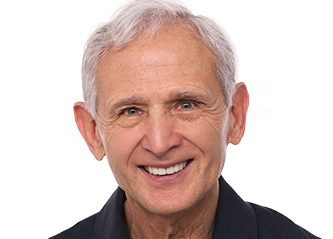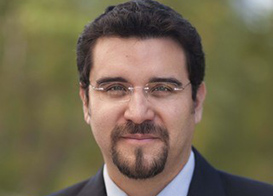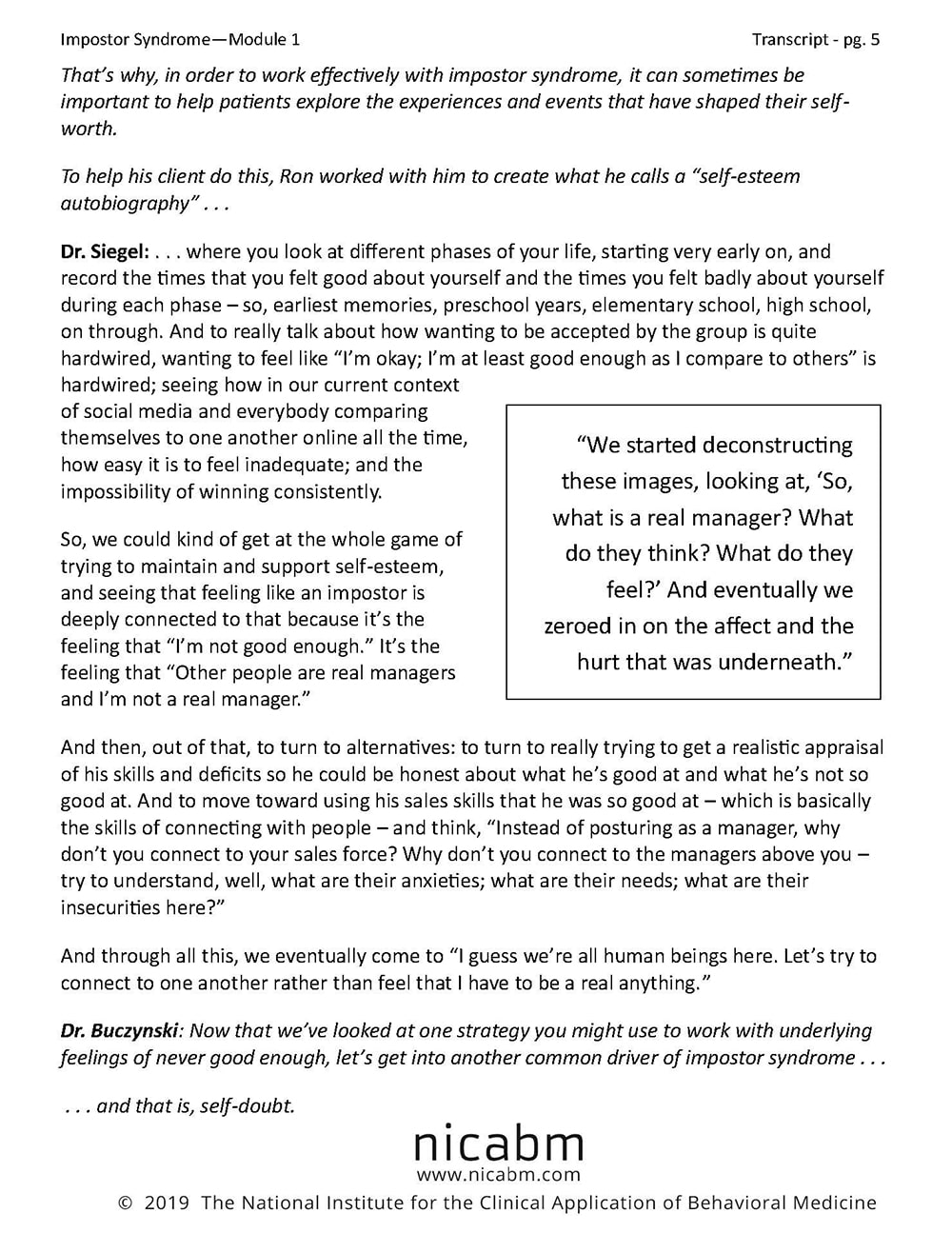50% Off – Sale Ends Tomorrow
50% Off – Sale Ends Tonight
Now 50% Off for a Limited Time
Impostor Syndrome: Working with Feelings of Inadequacy, Shame, and Self-Doubt That Keep Clients Trapped

 Almost everyone has experienced the pain of feeling inadequate, unworthy, or never good enough.
Almost everyone has experienced the pain of feeling inadequate, unworthy, or never good enough.
But while some can easily bluff their way into greater success and better opportunities, those who suffer from impostor syndrome can become locked in an exhausting cycle of questioning their abilities, discounting their achievements, and comparing themselves to others (while always coming up short).
When impostor syndrome is deeply ingrained in a client’s way of thinking, it can lead to shame, anxiety and depression. Not only that, it can take a heavy toll on the relationships that clients hold most dear.
And here’s the thing – impostor syndrome can happen to anyone, but there are certain people who are disproportionately susceptible to it.
So how can we neutralize the powerful forces that fuel impostor syndrome and help clients shift out of an impostor mindset?
We turned to 21 of the world’s top experts to hear how they work with clients who suffer from impostor syndrome . . .
. . . and collected their best strategies into this brand-new course . . .
— New Short Course —
Expert Strategies for Helping Clients Who Struggle with Impostor Syndrome

How to Identify What’s Triggering Your Client’s Impostor Syndrome
Ron Siegel, PsyD Shelly Harrell, PhD
Rick Hanson, PhD Lynn Lyons, LICSW
- Three Specific Internal Factors That Might Be Driving Your Client’s Impostor Syndrome (and Strategies for Working with Each One)
- How Feelings of Never Good Enough Are Intrinsically Linked to Impostor Syndrome (and One Way to Help Your Client Address Them)
- One Counterintuitive Approach for Working with the Self-Doubt That Fuels Impostor Syndrome

How to Work with the Specific Social Patterns That Can Perpetuate Impostor Syndrome
Kelly McGonigal, PhD Christine Padesky, PhD
Christopher Willard, PsyD Rick Hanson, PhD
Joan Borysenko, PhD Miguel Gallardo, PsyD
- One Way to Think About a Major Driver of Impostor Syndrome (and How It Can Adversely Affect Your Client’s Performance)
- Why the Experience of Impostor Syndrome Is Heightened for People in Marginalized Groups
- One Surprising Experience That Can Spark a Client’s Impostor Syndrome
- How to Help When Internalized Social Messaging Leads to Impostor Syndrome
- A 3-Step Approach to Help Clients Whose Coping Strategies Are Making Their Impostor Syndrome Worse

What’s Happening in the Mind and Body When Impostor Syndrome Takes Hold
Stephen Porges, PhD Deb Dana, LCSW
- How to Work with Deeply Engrained Feelings of Impostor Syndrome
- Two Types of Comparison That Can Impact Your Client’s Physiological State (and Their Influence on Impostor Syndrome)
- Specific “What If” Questions That Can Help Your Client Become Aware of Unconscious Contributors to Imposter Syndrome
- One Nervous System “Default” Response That Can Feel Safest (Even Though It Often Perpetuates Impostor Syndrome)

What to Know About the Body and Impostor Syndrome
Pat Ogden, PhD Kelly McGonigal, PhD Joan Borysenko, PhD
- The Link Between a Client’s Sense of Self and Their Body (and How This Can Shape Your Work with Impostor Syndrome)
- How to Engage Clients in the Use of Specific Movement Patterns That May Help Them Shift Out of Impostor Syndrome

How to Work with Impostor Syndrome That’s Rooted in Trauma
Janina Fisher, PhD Christopher Willard, PsyD
- The Critical Link Between Developmental Trauma and a Client’s Sense of Having a “False Self” (and How to Challenge This Notion)
- An Expert Technique to Help Clients Who’ve Experienced Trauma Recognize See Their Impostor Syndrome as a Survival Skill
- Simple Yet Skillful Languaging to Help Your Client Separate from the Belief That They’re an Impostor

How to Reframe Your Client’s Experience of Impostor Syndrome
Bill O’Hanlon, LMFT Michael Yapko, PhD
Kelly McGonigal, PhD Kelly Wilson, PhD
Resmaa Menakem MSW, LICSW, SEP
- One Key Shift That Can Help Your Client Move Out of an Impostor Mindset
- What to Do When a Client’s Impostor Syndrome Leads Them to Invalidate the Feelings of Others (and Why This Can Be So Problematic)
- Why an Understanding of the “Tragic Gap” Can Be Key in Helping Clients Who Struggle with Impostor Syndrome
- How to Work with a Client Whose Impostor Syndrome Won’t Let Up Even When They’ve Collected Evidence to Refute It
- Specific Language and Framing to Help Your Client Use Impostor Syndrome as Fuel for Growth

How to Work with the Impact of Impostor Syndrome on Your Client’s Relationships
Richard Schwartz, PhD Stan Tatkin, PsyD, MFT
Kelly McGonigal, PhD Deany Laliotis, LICSW Ron Siegel, PsyD
- The Link Between Impostor Syndrome and Exhaustion – and How to Help Your Client Understand Its Impact on Their Relationships
- One Way to Help Your Client See How a Past Relationship Might Be Feeding Their Present Experience of Feeling Like an Impostor
- An Attachment Exercise to Help Clients Challenge What’s Driving Their Impostor Syndrome
- The “Pivot Points” That Can Lead to Impostor Syndrome, and How to Help Your Client Identify Them

What Can Go Wrong When You’re Working with Impostor Syndrome
Resmaa Menakem MSW, LICSW, SEP Ron Siegel, PsyD
Christopher Willard, PsyD
- Exactly What to Say When You Make This Common Mistake in Addressing a Client’s Impostor Syndrome
- Why It’s Essential to Help Clients Pick Up on Patterns Within Their Experience of Impostor Syndrome (and One Way to Do It)
- The Importance of Using a Measured, Gradual Pace with Impostor Syndrome – A Case Study

How Practitioners Might Use a Personal Experience of Impostor Syndrome to Help Their Clients
Peter Levine, PhD Miguel Gallardo, PsyD
Ron Siegel, PsyD Michael Yapko, PhD Rick Hanson, PhD
- Three Specific Questions That Can Help Clients Reduce Their Preoccupation with Social Comparison
- How One Expert Was Able to Keep His Own Impostor Syndrome at Bay (and How You Can Use This Strategy with Your Clients)
- How to Work with Impostor Syndrome That Is Fueled by an Over-Attachment to Outcomes
Register Here for $197 $97
and get all the videos, audios, transcripts, learning tools, plus 4 bonuses
to help you work with clients who suffer from impostor syndrome
3.25 CE/CME Credits or Clock Hours are available for purchase at checkout.
Click HERE to get information about CE/CME credits and clock hours as well as speaker disclosures
For This Short Course, We Brought Together Some of the Top Experts in the Field

Stephen Porges, PhD
Developer of Polyvagal Theory; Distinguished University Scientist at the Kinsey Institute at Indiana University Bloomington and Research Professor in the Department of Psychiatry at University of North Carolina Chapel Hill.

Peter Levine, PhD
Founder of Somatic Experiencing; Author of Trauma and Memory: Brain and Body in a Search for the Living Past: A Practical Guide for Understanding and Working with Traumatic Memory.

Pat Ogden, PhD
Pioneer in Somatic Psychology; Founder and Director of Sensorimotor Psychotherapy Institute (SPI); Co-founder of the Hakomi Institute; Author of Sensorimotor Psychotherapy: Interventions for Trauma and Attachment.

Shelly Harrell, PhD
Licensed psychologist specializing in multicultural and community psychology; Professor of Psychology in the Graduate School of Education at Pepperdine University.

Richard Schwartz, PhD
Founder of Internal Family Systems (IFS) and The Center for Self Leadership; Author of Introduction to Internal Family Systems.

Miguel Gallardo, PsyD
Licensed Psychologist specializing in multicultural and social justice; Associate Professor at Pepperdine University’s Graduate School of Education and Psychology; author of Case Studies in Multicultural Counseling and Therapy.

Joan Borysenko, PhD
Founder of Mind/Body Health Sciences LLC; Author of New York Times Bestseller Minding the Body, Mending the Mind.

Ron Siegel, PsyD
Assistant Professor of Psychology, part time, Harvard Medical School; Author of The Mindfulness Solution: Everyday Practices for Everyday Problems and Sitting Together: Essential Skills for Mindfulness-Based Psychotherapy.

Kelly McGonigal, PhD
Health psychologist and lecturer at Stanford University; Author of The Upside of Stress: Why Stress Is Good for You and How to Get Good At It and The Willpower Instinct: How Self-Control Works, Why It Matters, and What You Can Do to Get More of It.

Bill O’Hanlon, LMFT
Co-developer of Solution-Oriented Therapy; Psychotherapist, speaker, and author of Do One Thing Different: Ten Simple Ways to Change Your Life.

Resmaa Menakem MSW LICSW SEP
Expert on conflict and violence; Teacher of Cultural Somatics; Former Director of Counseling Services for the Tubman Family Alliance; Former Behavioral Health Director for African American Family Services in Minneapolis.

Christine Padesky, PhD
Co-founder of the Center for Cognitive Therapy in Huntington Beach, California; Co-creator of Strengths-Based CBT; Co-author of Mind Over Mood and Collaborative Case Conceptualization.

Michael Yapko, PhD
Leading expert in clinical hypnosis and treating depression; Clinical psychologist and author of 15 books including his newest books, The Discriminating Therapist and Keys to Unlocking Depression.

Rick Hanson, PhD
Senior Fellow of the Greater Good Science Center at UC Berkeley; New York Times bestselling author of Hardwiring Happiness and Buddha’s Brain.

Christopher Willard, PsyD
Psychologist and educational consultant specializing in mindfulness; president of the Mindfulness in Education Network; serves on the board of directors at the Institute for Meditation and Psychotherapy.

Stan Tatkin, PsyD, MFT
Founder of the PACT Training Institute and developer of a Psychobiological Approach to Couple Therapy (PACT).

Deany Laliotis, LICSW
Director of Training at EMDR Institute; Specialist in treatment of traumatic stress disorders and attachment issues; author of chapters and articles on EMDR therapy.

Janina Fisher, PhD
Licensed clinical psychologist and Instructor at the Trauma Center, an outpatient clinic and research center founded by Bessel van der Kolk, MD; past president of the New England Society for the Treatment of Trauma and Dissociation.

Kelly Wilson, PhD
Co-author of Acceptance and Commitment Therapy: An Experiential Approach to Behavior Change; Founder of OneLife Education Training, LLC.

Lynn Lyons, LICSW
Author of Anxious Kids, Anxious Parents: 7 Ways to Stop the Worry Cycle and Raise Courageous & Independent Children, clinical social worker and psychotherapist specializing in anxiety in adults and children.

Deb Dana, LCSW
Coordinator of the Traumatic Stress Research Consortium at the Kinsey Institute; Developer of the Rhythm of Regulation Clinical Training Series; author of Polyvagal Theory in Therapy.

Course Director
Ruth Buczynski, PhD
Here's What You'll Get:
Everything is yours to keep forever in your professional library
|
|
Downloadable videos so you can watch at your convenience, on any device |
|
|
Audio recordings you can download and listen to at home, in the car, at the gym or wherever you like |
|
|
TalkBack Segments to distill key ideas (this is where we “land” the session) |
|
|
Next Week in Your Practice sessions to give you concrete strategies to use with patients |
|
|
Professionally-formatted transcripts of the sessions, to make review and action simple |
|
|
Three downloadable bonus videos to help you work with clients who suffer from impostor syndrome |
Get 3 Bonuses When You Buy Today

Bonus 1 – The Key Link Between Impostor Syndrome and Anxiety (and How to Work with It)
Ron Siegel, PsyD Kelly McGonigal, PhD
- Two Ways Anxiety Can Keep Clients Stuck in Feeling Like an Impostor
- How to Help Clients See That Anxiety Can Sometimes Give Them an Edge

Bonus 2 – Integrating Compassion-Based Approaches into Your Work with Impostor Syndrome
Peter Levine, PhD Kelly McGonigal, PhD
Christopher Willard, PsyD
- Why Compassion-Oriented Therapies Can Be Critical In Reversing Impostor Syndrome
- Why Cognitive Approaches to Impostor Syndrome Sometimes Fall Short
- A Quick and Easy Self-Compassion Exercise to Help Clients Struggling with Impostor Syndrome

Bonus 3 – How to Help Your Client See Vulnerability as a Remedy for Impostor Syndrome
Christine Padesky, PhD Kelly McGonigal, PhD
- A Simple Strategy That Can Shift Your Client’s Willingness to Show Vulnerability
- Case Study: How Experimenting with Vulnerability Helped One Client Develop a Stronger Sense of Belonging and a More Authentic Self
Register Here for $197 $97
and get all the videos, audios, transcripts, learning tools, plus 4 bonuses
to help you work with clients who suffer from impostor syndrome
3.25 CE/CME Credits or Clock Hours are available for purchase at checkout.
Click HERE to get information about CE/CME credits and clock hours as well as speaker disclosures
Here's What Your Peers Have Experienced In NICABM Programs

. . . I feel so fortunate to have this access to brain power, experience and research synthesis . . .
“When I listen to the experts talk openly about their experience, I feel so fortunate to have this access to brain power, experience and research synthesis on cutting edge issues! I go back to the videos to reinforce things that will assist my clients.”
Mary Logan, Counselor
Ipswich, MA

I benefit, my practice benefits, and most important my clients benefit . . .
“I live in Nova Scotia and have limited travel funds at the university at which I work. The series provided by NICABM gives me the rare opportunity to listen to the leaders in the field. As a result, I learn valuable information that would not otherwise be available to me. I benefit, my practice benefits, and most important my clients benefit from the knowledge and wisdom I gain from the series.”
David Mensink, PhD Counseling Psychology, Psychologist
Halifax, Nova Scotia, Canada

. . . some dare to go the extra journey to research and educate
“These NICABM series keep me afloat, in touch, on track, well trained in my field, and more personally healthy. The best aspect, though, is that I feel validated and comforted knowing that some dare to go the extra journey to research and educate, so I can walk the path to health, and can share with others.”
Mary Corsello-Vilcheck, LCSW
Midlothian, VA
Why the Transcript Is Essential:
- The transcript makes it easy to go back and double check concepts, citations and names that are mentioned
- We put in a table of contents to make it easy for you to find the exact part of the webinar you need
- Having the concepts already written allows you to take notes on how you’re going to use the ideas rather than transcribing the ideas
- Some people simply learn better by reading than by listening or watching
- You will be able to print out and share techniques presented in the session with your patients

“I really liked being able to follow along with the transcripts as I listened…it was nice not to feel like I had to take notes. I really feel like I remember more when I both hear and see at the same time.”
Mary Ellen McNaughton, Masters in Counseling, Psychology Counselor
Kelowna, British Colombia, Canada
You Are Protected By
NICABM’s Money-Back Guarantee
We invite you to register for this comprehensive training program without any risk. Unless you are completely satisfied, we will refund your money. Just let us know within 30 days from the date of registration. We are that confident that you will find this information to be more than you expected.
Layla from Pike Road, ALJust purchased the Working with Impostor Syndrome!4 hours ago
Register Here for $197 $97
and get all the videos, audios, transcripts, learning tools, plus 4 bonuses
to help you work with clients who suffer from impostor syndrome
3.25 CE/CME Credits or Clock Hours are available for purchase at checkout.
Click HERE to get information about CE/CME credits and clock hours as well as speaker disclosures

